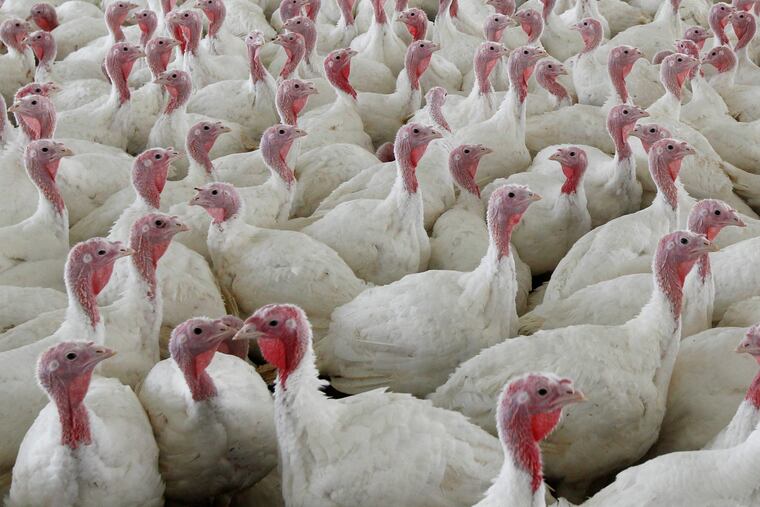60,000 Lehigh County turkeys impacted by deadly avian flu this month as Thanksgiving nears
Within the past week, the disease has impacted 31,900 turkeys on two separate Lehigh Valley farms.

An outbreak of highly pathogenic avian flu sweeping through U.S. commercial turkey farms has affected 50 million birds so far this year.
Just this month alone, the disease has impacted 60,400 turkeys across three different Lehigh Valley operators, according to the U.S. Department of Agriculture, which did not identify the growers.
Though the avian flu is almost always fatal to birds, it presents no real health risk to people.
Will I be able to buy a turkey for Thanksgiving?
Alex Baloga, president and CEO of the Pennsylvania Food Merchants Association, said people should not panic that turkeys won’t be available for Thanksgiving dinner.
“The main thing to know is you should be able to get your turkey and have your Thanksgiving as planned,” said Baloga, whose trade organization counts grocery stores, convenience stores, wholesalers and distributors as members.
Most of the frozen turkeys have already been shipped, Baloga said. And, even though the disease is impacting fresh turkeys now in Eastern Pennsylvania, it should not result in a shortage.
“At this point, our folks are not reporting challenges with a supply for Thanksgiving birds,” Baloga said.
Marcie Rivera, a spokeswoman with Wegmans, said the supermarket chain starts early in the year to secure enough turkeys for the holiday.
“We do not foresee any major issues,” Rivera said in an email.
What’s the threat to Pennsylvania turkeys?
However, the U.S. Department of Agriculture (USDA) does see the avian flu as a real threat to the $5 billion turkey production industry, particularly the recent outbreak of the highly pathogenic form of the influenza type A virus (influenza A) of avian origin. Most viruses are low pathogenic and cause only minor signs of infection in poultry.
The USDA has confirmed the presence of highly pathogenic avian influenza, which causes much more severe infections, in various commercial stocks this year.
According to the U.S. Centers for Disease Control and Prevention, no human cases of these avian influenza viruses have been detected in the United States, but the agency recommends people cook poultry and eggs to an internal temperature of 165˚F to kill all bacteria and viruses.
About 217 million turkeys were raised in the U.S. in 2021, totaling 7.18 billion pounds, according to the USDA. The top turkey producing states are Minnesota, North Carolina, Arkansas, Indiana, Missouri, Virginia, Iowa and California.
Although Pennsylvania is not among the top, it raises a substantial number of turkeys. In 2020, the latest year for which figures are available, growers in Pennsylvania raised 6.7 million of the birds totaling 191 million pounds valued at $135 million.
Shannon Powers, a spokeswoman for the Pennsylvania Department of Agriculture, said the disease has affected 21 commercial flocks in the state, nine backyard flocks, and more than 4.3 million birds. She said impacted farms have “special restrictions in place following confirmed infections.”
Powers said that poultry operations continue to experience threats from the disease and that whenever a detection is identified “a series of time-sensitive, tightly coordinated and difficult decisions are required of the bird owners.”
“We recognize the difficult business decisions growers and their employees are required to make in these situations and appreciate their cooperation and understanding in efforts to contain the virus,” Powers said.
Overall, the U.S. is the world’s largest turkey producer and exporter, according to the National Turkey Federation, a trade group representing farmers and processors.
To date, the USDA has confirmed the highly pathogenic avian flu in 262 commercial flocks in 46 states this year.